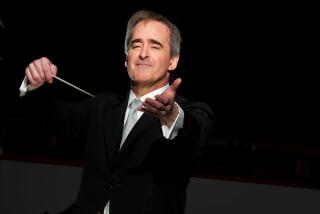Europe’s Maestros Have Nothing on Mississippi’s Affable Fulton
- Share via
SAN DIEGO — When it comes to conductors, Americans still have a prejudice for the European maestro, especially if he has a “Sir” before his name.
Thomas Fulton, however, is typical of a new generation of U.S. conductors with a solid reputation on both sides of the Atlantic. He has been in town over the past two weeks conducting San Diego Opera’s “Il Trovatore,” and tonight he will conduct the Verdi Requiem at the Civic Theatre.
“I think of the Requiem basically along the same vein as Verdi’s late-middle-period operas,” Fulton said. “It is definitely written in operatic style--not that he intended to write an opera to be performed in church--but it needs operatic voices as soloists. And it needs a sound from the chorus that is equal to that of the first act of ‘Otello.’ ”
In his speech, the affable conductor exhibits a mixture of influences, combining the rapid-fire delivery of a seasoned New Yorker--in recent years he has been a regular conductor at the Metropolitan Opera--with more than a touch of Southern vowel inflection. The latter influence comes from growing up in Mississippi and attending school in Tennessee before his stint at Philadelphia’s Curtis Institute.
Fulton’s musical route to the conductor’s podium was equally circuitous. He first studied piano and later received his undergraduate scholarship as a clarinet soloist.
“The school I went to, the University of Tennessee, had very limited money for piano scholarships, so mine was in clarinet,” Fulton said. “I played in the university wind ensemble for three years.”
At Curtis, he chose a conducting career over that of a pianist, although as recently as a year and a half ago he accompanied soprano Renata Scotto in a recital tour of the Orient. Accompanying singers, he admitted, gave him his predilection for opera conducting.
“I just started playing for all the local high school sopranos and mezzos who were floating around in Mississippi,” he said.
On the podium he has made his reputation with the standard Italian repertory.
“I’ve tended to be slightly pigeonholed because I’ve done so much Verdi and Puccini, but I would like to do more of German work,” he said.
Fulton has also conducted Beethoven’s “Fidelio” for the Metropolitan, but little-known French opera has become his gourmet specialty. In 1985, he made his Paris Opera debut conducting a revival of Meyerbeer’s “Robert le Diable,” the first time that morsel of French grand opera history had been performed there in nearly 100 years. If the Parisian critics treated the Meyerbeer revival with scorn and condescension, the audiences loved its spectacle and reserved their greatest applause for Fulton and American soprano June Anderson.
For Angel records, he recorded two other obscure French operas, Adolphe Adam’s “Le Postillion de Lonjumeau” and “La Muette de Portici” by Daniel Auber.
“These pieces were once really popular in France, and the record companies think they should be recorded,” Fulton said. “They have a lot of good music--you can understand why they were popular.”
Fulton compared conducting the Requiem with performing operas in concert, which appeals to the perfectionist side of his musical personality.
“In concert you can enjoy a certain kind of concentration you could never get on the stage. There are certain operas--maybe ‘Il Trovatore’ is one of them--where you wouldn’t miss the staging,” he added.
Referring to the San Diego Opera production he completed last Sunday, he asked, “Just what are they doing on stage, anyway? How can you stage a duet between a baritone and a soprano that lasts 10 minutes and they say one thought the whole time? That’s the reason the ‘lunge and lurch’ school was developed--to give the poor singers something to do!”
Verdi’s Requiem, without lunges or lurches, will be sung at the Civic Theatre at 8 p.m. The soloists are soprano Carol Neblett, mezzo-soprano Dolora Zajic, tenor Dennis O’Neill and bass-baritone Jeffrey Wells.
More to Read
The biggest entertainment stories
Get our big stories about Hollywood, film, television, music, arts, culture and more right in your inbox as soon as they publish.
You may occasionally receive promotional content from the Los Angeles Times.










